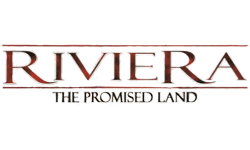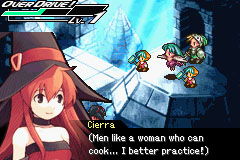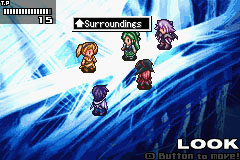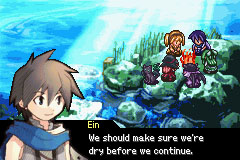|
|

|
BATTLE SYSTEM
|

|
INTERACTION
|

|
ORIGINALITY
|

|
STORY
|

|
MUSIC & SOUND
|

|
VISUALS
|

|
CHALLENGE
|
Easy
|
COMPLETION TIME
|
25-35 Hours
|
|
OVERALL
3.0/5.0
|
Rating definitions
|
|
|
In 2002, Japanese developer Sting produced an RPG for Bandai's Wonderswan Color entitled Yakusoku no Chi: Riviera, which saw two years later a port for the Gameboy Advance, and the next year, American localization as Riviera: The Promised Land thanks to Atlus. Though warmly received in North America, there are nonetheless a number of niggling imperfections with the overall package preventing it from being the best RPG it could be.
Combat in Riviera is turn-based, although there are no random encounters of which to speak in the game; rather, battles occur frequently at points in the game's story. Before a battle begins, the player chooses a three-character formation (one or two characters in the front and the other two/one in the back), chooses three of up to five acquirable characters to fight, and then selects up to four items to bring into battle. Before a battle begins, moreover, the player can analyze the enemy; their weaknesses and strengths and the effectiveness that each character has with the game's various types of weapons and items are very important when choosing what to bring into battle.
 Cierra makes NOW angry
Cierra makes NOW angry
|
|
When you finally start a battle, your party occupies the lower-left area of the screen, and enemies the upper-right. Characters and enemies take turns one at a time, with characters able to use one of the four items brought into battle when one reaches his/her turn. Although bringing only four items into battle would theoretically add strategy, the fact that each weapon or item has fixed targets (i.e. one random enemy, front row, back row, etc.) sort of chips away at this, and can needlessly prolong many fights. Each weapon and item, moreover (except Ein's sword), has a certain number of durability points, decreased after repeated use in story fights, and disappearing when durability reaches zero.
Another feature is the Overdrive meter in the upper-left corner of the battle screen, which builds up to three levels as your characters attack and enemies attack them. To access Overdrives for certain items, characters must master them after repeated use (mastering Overdrives also boosts character stats, given the lack of a traditional experience system). Overdrives consume a certain number of levels from the gauge depending on a character's effectiveness with a particular weapon or item, with a higher Overdrive level meaning more power and effectiveness. However, enemies, too, can use Overdrives, with a gauge in the lower-right corner indicating how close they are to using one.
Each item, moreover, has a charge time after usage before a character can take another turn, although it might've been nice to be able to see who could take their turn when, and battles themselves need at least one more item slot to be fully enjoyable, given the vast diversity of items; the rarity of healing items is also annoying. Additionally, the game limits the number of items your party can carry outside of battle, with the need to discard items constantly with a loaded inventory being a cut below infuriating, and a feature that simply shouldn't exist in any RPG today, especially given the lack of depositories.
One major redeeming quality of combat, however, is the ability to fight "practice" battles aside from story fights, where characters can use weapons and items, master Overdrives, and increase stats, without consuming durability points. Overall, the battle system is functional, if nothing more.
 Ein and company try and solve the mystery of the floating text
Ein and company try and solve the mystery of the floating text
|
|
Despite the restrictive nature of combat, Riviera is surprisingly easy, especially if you take the time to fight practice battles to master Overdrives and build stats, keep in mind enemy weaknesses before beginning battles, make good use of your Overdrives, and (try to) manage your inventory well.
After you win a battle, your characters gain new Overdrives and increased stats if they mastered a weapon or item, and gain a rank depending upon how they performed in battle (ending a battle with an Overdrive usually means a higher rank). Depending upon this rank, players gain a certain amount of TP to use outside of battle.
Dungeon and town exploration in Riviera are much simpler than in most other RPGs, with TP being necessary to inspect various parts of your party's environs, such as statues, treasure chests, suspicious cracks, and so forth, and no free movement within each area. Certain areas require players to press a certain sequence of buttons in a few seconds to disarm chests, avoid falling objects, and so forth, and at the end of each chapter, the game "scores" how well you did during the chapter, giving you a certain amount of TP with which to start the next chapter. This kind of interaction is acceptable, though the inability to backtrack in most areas is a bit annoying, and some of the dungeon design late into the game is a bit irksome.
Riviera is a mildly-inventive game, with its method of dungeon exploration being fairly unique, although its battle system derives elements from other RPGs, such as weapon and item durability from the SaGa series. The Overdrive system, moreover, resembles Reward attacks from Rhapsody, Star attacks from Paper Mario 2, and the FP system from the Wild ARMs series. The story also has roots in Norse mythology, and overall, Riviera is somewhere in the middle in terms of creativity.
 You should get rid of all your beer, then...
You should get rid of all your beer, then...
|
|
Although the game is heavily story-driven, the plot's execution leaves something to desire. The pacing is decent, to be certain, although the characters spend way too much time discussing their environs and repeat themselves a bit too often, somewhat diverting attention away from the main story. Most characters also lack meaningful development, though there are maybe one or two interesting twists in the story, even if these particular twists seem a bit rushed. In the end, the story is functional, if nothing more.
The music, as with most Gameboy Advance titles, also leaves something to desire. This is not to say the soundtrack is garbage, since some of the pieces are actually quite good, although primitive digital instruments such as blips and duts crop up with terrifying regularity. The vocals throughout the game are a decent, though highly unnecessary, addition, though there really isn't much excuse for the music's mediocre quality, given the GBA's ability to produce vocals of good quality.
The visuals aren't much to write home about, either. Again, this isn't to say they're bad; character and monster sprites, not to mention their environs, contain decent design, although the sprites don't show much emotion, with the art doing the work during cutscenes. Moreover, dozens of rooms in each dungeon look annoyingly similar, and overall, the graphics leave plenty of room for improvement.
Finally, there aren't many extras of which to speak in Riviera, whose playing time ranges from around twenty-five to thirty-five hours, and which ultimately proves to be an all-around average RPG. Pretty much every aspect leaves room for improvement, although the game is certainly playable, perhaps a decent time-killer.
Review Archives
|









